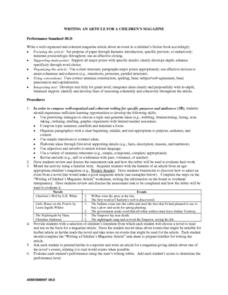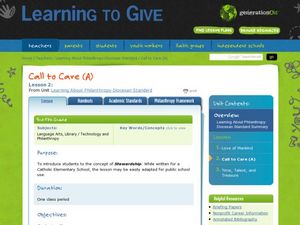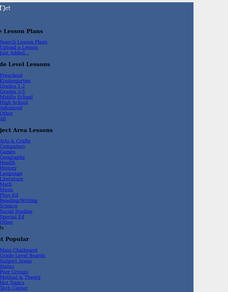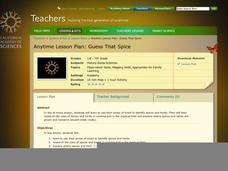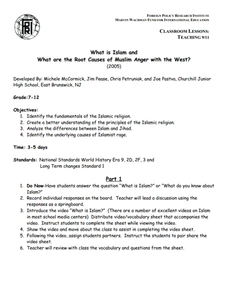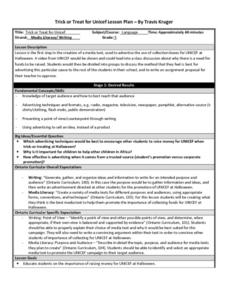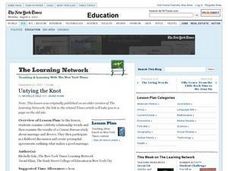Curated OER
Introduction to Bacteria
Beginning biologists survey several websites to learn about the types, structure, motility, feeding habits, and reproductive methods of bacteria. All websites are linked to the lesson plan, so you can have individuals access it and click...
Curated OER
WRITING AN ARTICLE FOR A CHILDREN'S MAGAZINE
Young scholars engage in the writing of a magazine article. They focus upon the reading of a children's fiction book and create an informative narrative. They create main ideas and supporting details for the article. The supporting of...
Curated OER
Learning About Philanthropy - Diocesan Standard
Students identify the concept of stewardship. In this stewardship lesson, students create stewardship lists, complete stewardship surveys, and learn six new words related to stewardship by listing them in acrostic poem.
Curated OER
What's in a Garden?
Learners explore the concept of philanthropy. In this service learning lesson, students plan a garden. Learners write a paragraph in their journals giving their recommendation on how their garden should be laid out.
Curated OER
All About Penguins
Second graders research penguins. In this all about penguins lesson, 2nd graders identify facts from their readings and write an expository paper using proper capitalization and punctuation.
Curated OER
Cooperative Learning, Sci., Tech., Lang
Students research, write, edit, revise and present a paragraph, using word processor, about animal of their choice, including description, where animal lives, what it eats, its habits, e.g. is it endangered, migration, hibernation,...
Curated OER
Seems Like a Million Bucks
Students explore philanthropy. In this service learning lesson, students read Sam and the Lucky Moon, identify the elements of the story, and examine the benefits and costs of giving.
Curated OER
All about Greece
In this Greece learning exercise, students learn and report about Greece. Activities include geography, natural resources, recipes, landmarks, history and climate. Students do their own research.
American Museum of Natural History
Make Your Own Paper
Paper, paper everywhere. Paper is so prolific that few think about where the idea for it originated and how it is made. Introduce young readers to the paper-making process with an activity that lets them create their own.
Curated OER
Setting the Stage for Service Related Learning Relationships
Students understand the stereotypes and realities of older people. In this philanthropic instructional activity, students in groups read and report on the positive images of older people in children's books. Students address the needs...
Curated OER
Alphabet
Primary learners will make posters, trace letters, and eat letter cereal, all to learn about the alphabet. They will also go on a scavenger hunt around the room looking for letters. This resources has lots of ideas for bringing about...
American Museum of Natural History
Einstein in Time
Einstein sure had an interesting life. Using a remote learning resource, pupils examine a timeline of Einstein's life. They learn about the major scientific discoveries as well as humanitarian and social work. Additionally, they read...
California Academy of Science
Guess That Spice
From medical treatments to cooking, people have been using herbs and spices for thousands of years. Perform a blind smell test of household herbs and spices to engage young scholars in learning about ancient spice trading. Research the...
National Constitution Center
Address America: Your Six-Word Stump Speech
Stump speeches are the focus of this exercise that combines politics and language arts. After learning about this type of speech, the class listens to Obama's 2008 presidential campaign stump speech and answers a series of questions that...
Foreign Policy Research Institute
What is Islam and What are the Root Causes of Muslim Anger with the West?
A video and magazine article provide the foundation for learning about Islam and why some Muslims are angry with Western society. In groups, students identify the causes of hostility and prepare a presentation that explains them. While...
Curated OER
Trick or Treat for Unicef
Creative thinkers develope advertisements. They work in groups to create an advertisement featuring the importance of contributing to UNICEF. They research, learn about point of view, and present final projects to the class.
Curated OER
What Do Writers Do?
Pupils learn about honing their writing through editing. They write the beginning of a story, paying attention to vocabulary and detail. Then they split into groups of two to peer edit. After discussing ways they can improve their...
Curated OER
Reading About Children in Other Communities
Students read about children from other communities. They describe ways in which members of other communities meet one another's needs and design a Venn diagram that compares and contrasts their own way of living to another culture.
Curated OER
Reading About Children from Other Places in the World: Structured Research Project
Young scholars read about children in Ghana, Sri Lanka and Haiti. They compare these children to themselves in a structured lesson that focuses on note taking and research skills. Students work in groups to write a short essay about the...
Curated OER
Untying the Knot
What are the current trends in divorce? What contributes to this? Examine celebrity relationship trends and how they relate to the general public with this discussion lesson. Middle schoolers analyze the results of a Census Bureau study...
Curated OER
Short and Sweet Science
Readers learn how to summarize scientific text and evaluate the advantages, disadvantages, and challenges in writing summaries. They select science-related articles you've pulled and collected from the New York Times and, with a partner,...
Curated OER
Unforgettable...
Middle and high schoolers remember their most memorable experiences, and then connect their own narrative with an exposition about the topic associated with their experience. This New York Times lesson plan would be a great addition to...
Curated OER
Making a Case
Start the day by sharing opinions about human rights. Then, read "A Defiant Hussein Pleads Not Guilty to Mass Execution" with your middle and high school class. Your pupils research the specific charges in the case against Saddam...
Curated OER
Learning About Emotions
Students participate in a series of activities about identifying different feelings and emotions. In these oral language and discussion lessons, students use pictures and photographs to get them involved in oral storytelling activities....



